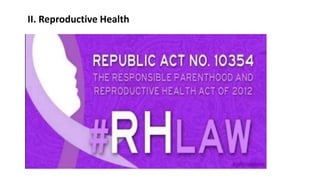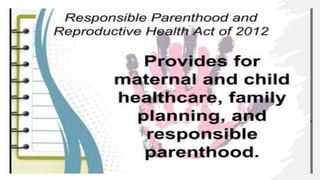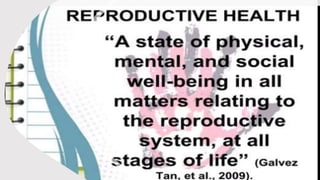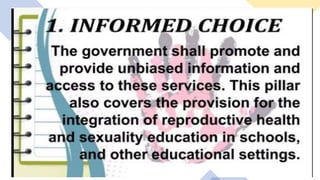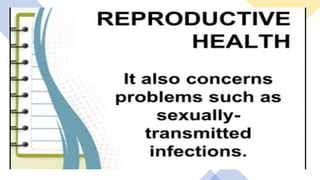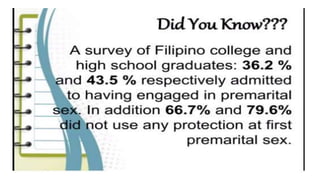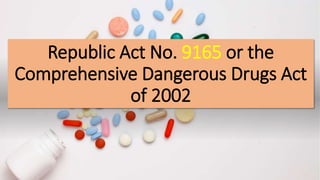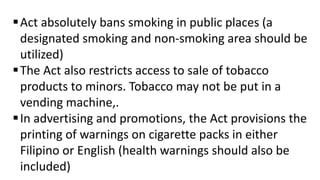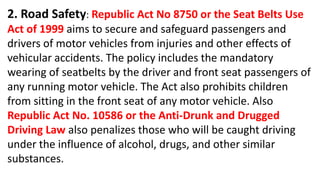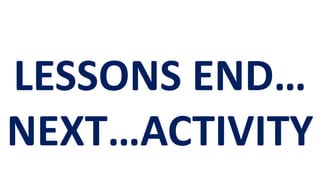Q2-Health10.Health Trends, Issues, and Concerns pptx
- 2. Unit 2: Health Trends, Issues, and Concerns in the National Level
- 3. I. CONSUMER ACT • consumer rights • Republic Act No. 7394 or the Consumer Act of the Philippines objectives(3) • Republic Act 8423 or the Traditional and Alternative Medicine Act of 1997 (TAMA),..PITACH
- 18. Substance Use and Abuse Gateway drugs may be considered as windows to unprotected sex. These are drugs “that people use initially that may eventually lead to the abuse of illegal drugs” (Galvez Tan, et al., 2009). Alcohol and tobacco are gateway drugs. When alcohol is consumed, the central nervous system is affected. Thus, a person is more vulnerable to doing dangerous acts because of depressed decision- making skills.
- 19. Republic Act No. 9165 or the Comprehensive Dangerous Drugs Act of 2002
- 20. Republic Act No. 9165 or the Comprehensive Dangerous Drugs Act of 2002 protects citizens from the harmful effects of dangerous drugs to their physical and mental well-being.
- 21. According to the policy, here are some which are considered as unlawful acts and are subject to penalties and fines. a. Importing of dangerous drugs and/or controlled precursors and essential chemicals (narcotic drugs and psychotropic substances) b. Selling, trading, administering, dispensing, delivering, distributing, and transporting dangerous drugs and/or controlled precursors and essential chemicals c. Maintaining a drug den, drive, or resort d. Manufacturing of dangerous drugs and/or controlled precursors and essential chemicals e. Manufacturing or delivery of equipment, instrument, apparatus, or other paraphernalia for dangerous drugs and/or controlled precursors and essential chemicals f. Possessing dangerous drugs, equipment, instrument, apparatus, or other paraphernalia g. Possessing dangerous drugs during parties, social gatherings or meetings h. Cultivating or culturing plants classified as dangerous drugs or sources of such i. Unnecessary prescribing dangerous drugs
- 22. Republic Act No. 9211 or the Tobacco Regulation Act of 2003 protects people from the sale, use, and advertisements of hazardous tobacco products.
- 23. Act absolutely bans smoking in public places (a designated smoking and non-smoking area should be utilized) The Act also restricts access to sale of tobacco products to minors. Tobacco may not be put in a vending machine,. In advertising and promotions, the Act provisions the printing of warnings on cigarette packs in either Filipino or English (health warnings should also be included)
- 24. Social Health 1. Cybercrime: “Cyber refers to a computer or a computer network, the electronic medium in which online communication takes place”. Thus, cybercrime is simply any crime committed in cyberspace. To protect the citizens from this concern, the government mandated Republic Act No. 10175 or the Cybercrime Prevention Act of 2012. The law mandates the prohibition of cybersex, child pornography, unsolicited commercial communications, and computer-related identity theft.
- 25. 2. Child Pornography: “Child pornography” refers to any representation, whether visual, audio, or written combination thereof, by electronic, mechanical, digital, optical, magnetic or any other means, of child engaged or involved in real or simulated explicit sexual activities” Republic Act No. 9775 or the Anti-Pornography Act of 2009 defines a “child”. “Child” refers to a person below eighteen (18) years of age or over but is unable to fully take care of himself/herself from abuse, neglect, cruelty, exploitation or discrimination because of a physical or mental disability or condition. For the purpose of this Act, a child shall also refer to: (1) a person regardless of age who is presented, depicted or portrayed as a child as defined herein; and (2) computer- generated, digitally or manually crafted images or graphics of a person who is represented or who is made to appear to be a child as defined herein. 3. Hazing : Republic Act No. 8949 or the Anti-Hazing Law. The Act penalizes those who will go too far during initiation rites wherein the “applicant” is subjected to severe physical and emotional pain and suffering.
- 26. 4. Blood Donation: Republic Act No. 7719 or the National Blood Services Act of 1994 aims to promote and encourage voluntary blood donation by the citizenry, provide for adequate, safe and affordable and equitable distribution of blood and blood products. Safety in the Environment 1.
- 29. 2. Road Safety: Republic Act No 8750 or the Seat Belts Use Act of 1999 aims to secure and safeguard passengers and drivers of motor vehicles from injuries and other effects of vehicular accidents. The policy includes the mandatory wearing of seatbelts by the driver and front seat passengers of any running motor vehicle. The Act also prohibits children from sitting in the front seat of any motor vehicle. Also Republic Act No. 10586 or the Anti-Drunk and Drugged Driving Law also penalizes those who will be caught driving under the influence of alcohol, drugs, and other similar substances.




